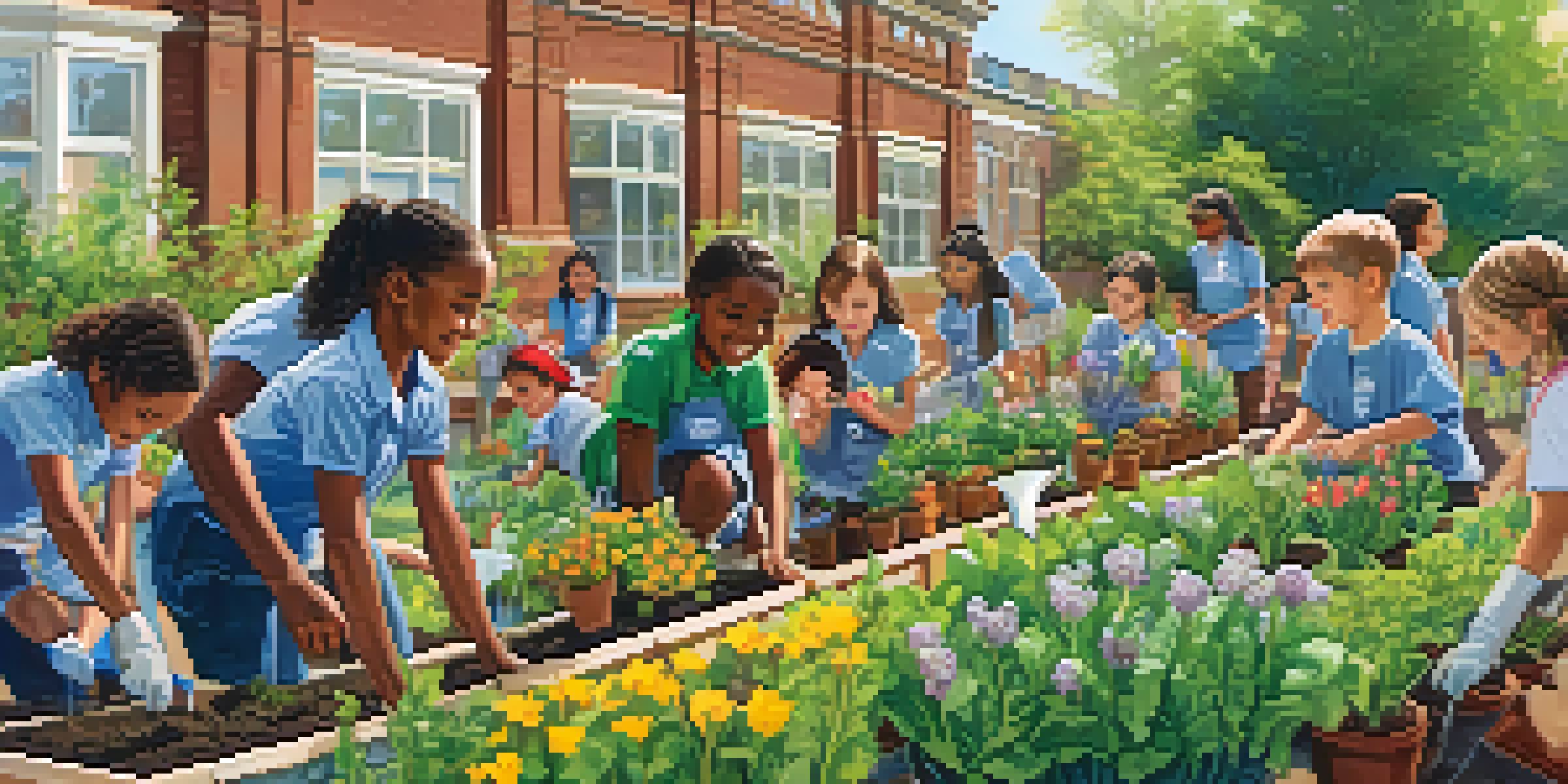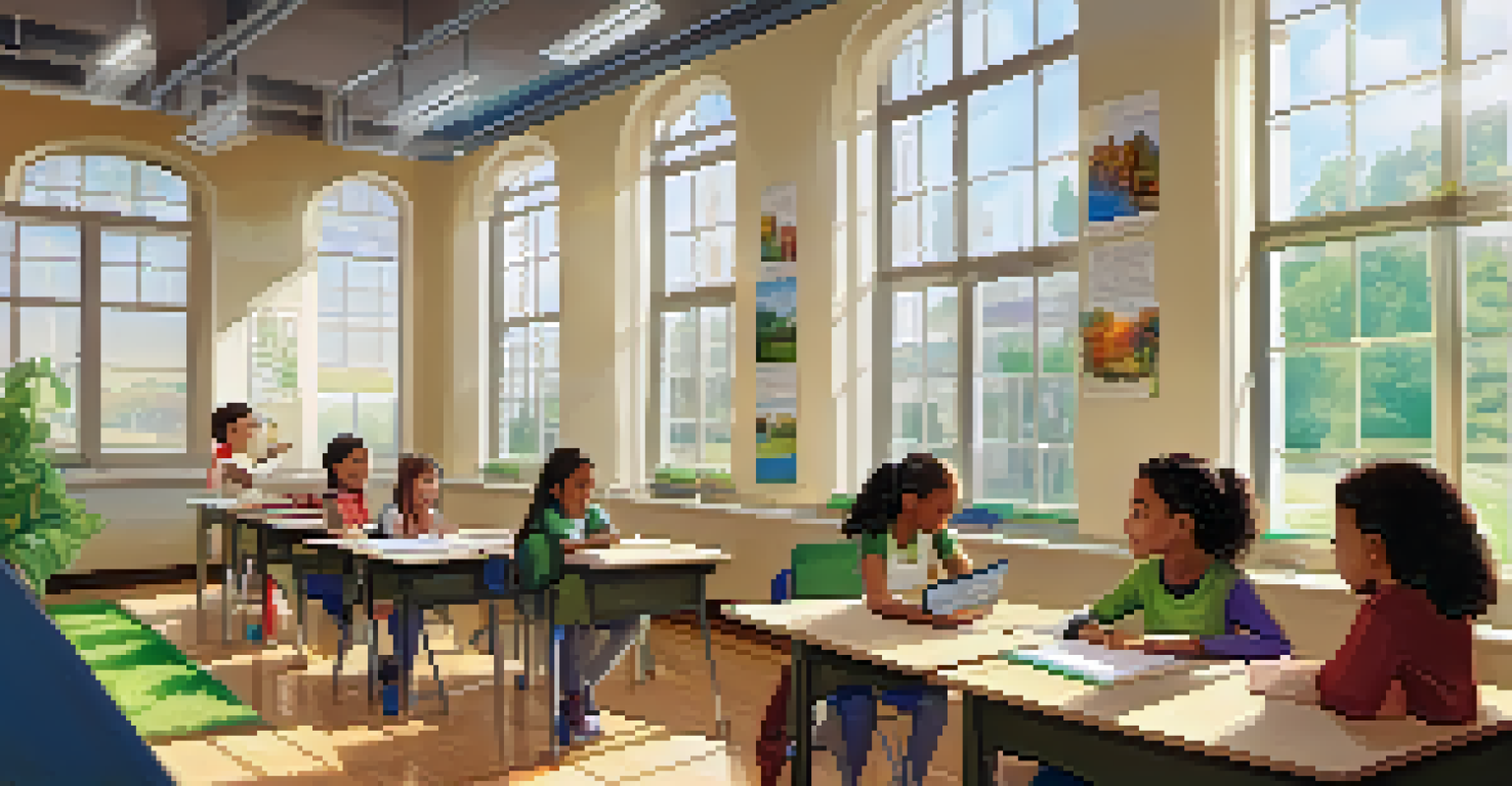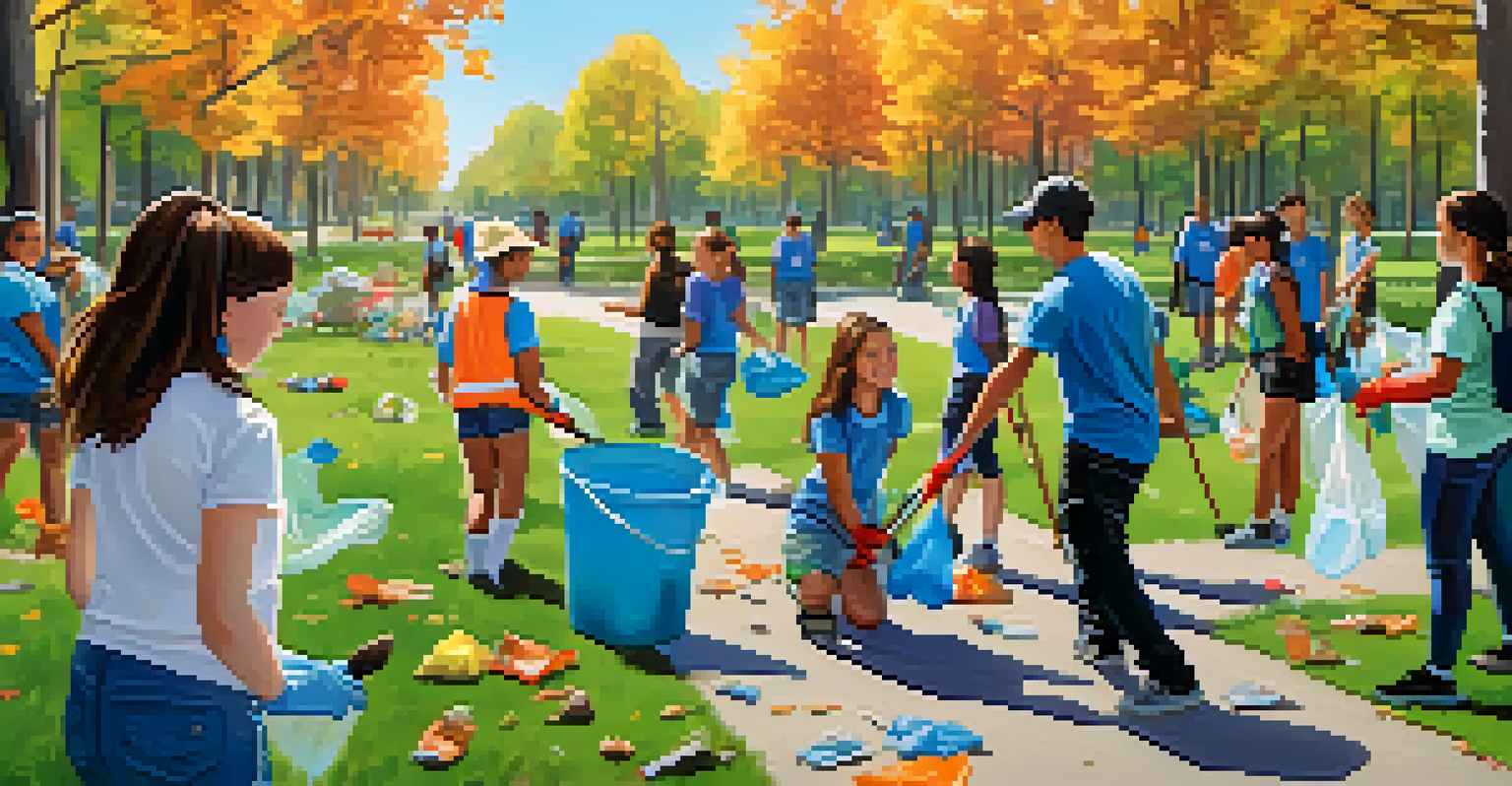Building a Sustainable Future Through Education

Understanding Sustainability in Education
Sustainability in education refers to teaching practices that promote environmental stewardship and social equity. It encourages students to think critically about their impact on the planet and their communities. By integrating sustainability into curricula, we equip young minds with the tools to address pressing global challenges. Essentially, it’s about preparing them not just to survive, but to thrive in a world that demands responsible citizenship.
Education is the most powerful weapon which you can use to change the world.
This concept goes beyond textbooks; it involves experiential learning that connects students with their environment. For instance, school gardens can teach students about ecosystems, while local clean-up initiatives foster a sense of community responsibility. Such hands-on experiences make the principles of sustainability tangible and relatable, igniting a passion for change among students. Ultimately, it’s about creating informed citizens who are ready to advocate for a healthier planet.
Moreover, sustainability in education is not limited to environmental issues. It also encompasses social justice, economic viability, and cultural respect. By addressing these interconnected themes, educators can cultivate a holistic understanding of what it means to be sustainable. As a result, students learn that their choices have far-reaching consequences, shaping not only their lives but the future of our planet.
The Role of Educators in Promoting Sustainability
Educators play a pivotal role in fostering a culture of sustainability within their classrooms. They are not just transmitters of knowledge; they are mentors who inspire students to become proactive agents of change. By modeling sustainable practices, such as reducing waste or conserving energy, teachers set a powerful example for their students to follow. This influence can spark curiosity and motivate students to adopt similar habits in their own lives.

In addition to their actions, educators can infuse sustainability into discussions across various subjects. Whether in science, literature, or art, the principles of sustainability can be woven into lessons to highlight its relevance. For example, discussing environmental themes in literature can deepen students’ understanding of ecological issues while enhancing their critical thinking skills. This interdisciplinary approach not only enriches learning but also reinforces the importance of sustainability.
Sustainability Empowers Future Leaders
Integrating sustainability into education equips students with the knowledge and skills necessary to address global challenges.
Furthermore, professional development for educators is essential to equip them with the latest knowledge and tools in sustainability education. Workshops and training sessions can provide insights into innovative teaching methods, resource management, and community engagement. By investing in educators, we’re investing in a future where sustainability is at the forefront of educational agendas, ultimately benefiting society as a whole.
Engaging Students Through Experiential Learning
Experiential learning is a dynamic way to engage students and deepen their understanding of sustainability. By participating in real-world projects, students can see the direct impact of their actions. For instance, organizing a recycling program at school can teach them about waste management while instilling a sense of ownership and responsibility. This hands-on approach makes learning more meaningful and memorable.
The greatest threat to our planet is the belief that someone else will save it.
Field trips to local environmental sites, such as nature reserves or recycling facilities, can also enhance students' appreciation for sustainability. These experiences allow them to witness ecological systems in action and understand the importance of conservation efforts. When students connect the dots between their education and the world around them, they become more motivated to take action. This shift in perspective can lead to lifelong habits of sustainability.
Moreover, project-based learning encourages collaboration and critical thinking. Students can work together to devise solutions for local environmental issues, fostering teamwork and creative problem-solving skills. This collaborative environment not only empowers students but also helps them build a sense of community. When students feel they are part of something bigger, their commitment to sustainability is likely to grow.
Incorporating Technology in Sustainability Education
Technology can be a powerful ally in promoting sustainability education. Digital tools can enhance learning by providing access to a wealth of information and interactive resources. For example, apps that track carbon footprints can help students understand their environmental impact in real-time. By utilizing technology, educators can create engaging lessons that resonate with tech-savvy students.
Moreover, online platforms can facilitate global collaboration among students. Virtual exchanges can connect classrooms from different parts of the world, allowing students to share ideas and experiences related to sustainability. These interactions can broaden their understanding of global issues while fostering empathy and cultural awareness. Technology, therefore, not only enhances learning but also builds a sense of global citizenship.
Experiential Learning Engages Students
Hands-on experiences, like community projects and field trips, make sustainability concepts relatable and encourage active participation.
Additionally, incorporating technology into sustainability projects can yield innovative solutions. Students can use data analysis tools to assess local environmental conditions or develop apps that promote sustainable practices. By blending creativity with technology, students become active participants in shaping a sustainable future. This approach encourages them to think critically and act responsibly, skills that are essential for the challenges ahead.
Community Involvement: A Key to Sustainability Education
Community involvement is crucial for effective sustainability education. When schools collaborate with local organizations, they create opportunities for students to engage with real-world sustainability challenges. For instance, partnerships with environmental groups can lead to community clean-up events or tree-planting initiatives, allowing students to contribute positively to their surroundings. This connection between education and community fosters a sense of belonging and responsibility.
Moreover, inviting community members to share their expertise can enrich students' learning experiences. Local farmers, environmental scientists, or conservationists can provide valuable insights into sustainable practices and challenges. Guest speakers can spark curiosity and inspire students to pursue careers in sustainability-related fields. By bridging the gap between the classroom and the community, students gain a broader perspective on the importance of sustainability.
Additionally, community service projects can instill a sense of pride and commitment among students. When they see the tangible results of their efforts, such as cleaner parks or restored habitats, it reinforces the idea that they can make a difference. This hands-on involvement not only enhances their understanding of sustainability but also cultivates a lifelong commitment to serving their communities.
Global Perspectives on Sustainability Education
Sustainability education is a global endeavor, transcending borders and cultures. Different countries have unique approaches to integrating sustainability into their educational systems, providing rich opportunities for learning. For instance, Scandinavian countries often emphasize outdoor education, teaching students about nature through direct experience. By studying these diverse methods, educators can adopt best practices that resonate with their own communities.
Furthermore, global events, such as the United Nations' Sustainable Development Goals (SDGs), highlight the urgency of sustainability education. These goals serve as a framework for countries to align their educational initiatives with pressing global challenges. By fostering awareness of these goals, educators can guide students in understanding their role as global citizens. This perspective encourages them to think beyond their immediate environment and consider the broader implications of their actions.
Community Collaboration Enhances Learning
Partnerships between schools and local organizations provide real-world insights and foster a sense of responsibility among students.
Incorporating global perspectives also enriches students' understanding of cultural diversity and environmental issues. Discussions about sustainability in a global context can lead to deeper insights into how different communities address similar challenges. This awareness not only broadens their worldview but also promotes empathy and collaboration across cultures. Ultimately, a global approach to sustainability education prepares students for a world where interconnectedness is key.
The Future of Education in a Sustainable World
As we look towards the future, the role of education in promoting sustainability will only grow in importance. The challenges of climate change, resource depletion, and social inequality require a generation that is well-informed and proactive. By embedding sustainability into educational frameworks, we can cultivate responsible leaders who are equipped to tackle these issues head-on. Education must evolve to meet these demands, ensuring that future generations are prepared for the complexities of a sustainable world.
Moreover, the integration of sustainability into education can drive innovation. As students explore creative solutions to environmental problems, they may develop groundbreaking ideas and technologies that revolutionize industries. Encouraging an entrepreneurial mindset in sustainability education can lead to new business models and practices that prioritize the planet. This shift not only benefits the environment but also creates economic opportunities that align with sustainable development.

Ultimately, building a sustainable future through education requires a collective effort from educators, communities, and policymakers. By prioritizing sustainability in education, we can empower students to become change-makers who advocate for a healthier planet. As we invest in their education, we invest in a brighter future for all, where sustainability is not just an ideal, but a way of life.